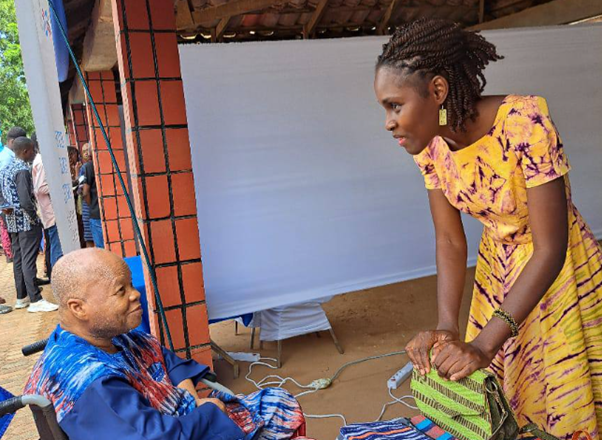Burkina Faso and Benin offer a glimpse into the diverse and thriving textile traditions of West Africa. The artisans behind Faso Danfani textiles cotton hand spinning are preserving their cultural heritage and contributing to a more sustainable and ethical fashion industry. By supporting these artisans and their work, we can help ensure that these ancient crafts continue to thrive for generations to come.
Burkina Faso: Faso Danfani Textile Weaving
Mme Flora Lankoande, the founder of the social enterprise CABES GIE in Burkina Faso, captivated visitors with her stunning Faso Danfani textiles. Unique fabrics woven from organic cotton. Sustainably grown in the region. The process of creating Faso Danfani textiles involves several intricate steps, including:
- Cotton Cultivation: Organic cotton seeds planted in carefully selected fields. Ensuring sustainable farming practices and minimizing environmental impact.
- Harvesting: Ripe cotton bolls harvested by hand. Preserving the quality of the fibers.
- Ginning: Cotton is cleaned and separated from the seeds. Preparing it for weaving.
- Dyeing: Natural dyes derived from plants, minerals, and insects used to create a vibrant palette of colors.
- Weaving: Skilled artisans use traditional looms to weave the dyed cotton into intricate patterns. The weaving process requires precision and patience. Thread interlaced.
Faso Danfani textiles have renowned durability. Also their breathability and unique aesthetic. Vibrant colors and intricate patterns inspired by traditional African motifs. Reflecting the rich cultural heritage of Burkina Faso.

Benin: Cotton Hand Spinning
Mme Dehanatou Tairou Issa, director of Espace Tissage de Djougou in Benin, demonstrated the meticulous process of transforming raw cotton seeds into beautiful thread. This time-honored craft involves several steps:
- Cotton Preparation: Raw cotton seeds are cleaned and ginned. To separate the fibers from the seeds.
- Carding: Cotton fibers are combed and blended. To create a uniform consistency.
- Spinning: Using a hand-held spindle, artisans twist the cotton fibers into thread. This process requires skill and dexterity. The thread spun evenly and tightly.
Cotton hand spinning is a labor-intensive process that requires patience and precision. The resulting thread is strong, durable, and has a unique texture that adds character to the woven fabrics.
These two countries, Burkina Faso and Benin, offer a glimpse into the diverse and thriving textile traditions of West Africa. The artisans behind Faso Danfani textiles and cotton hand spinning are preserving their cultural heritage and contributing to a more sustainable and ethical fashion industry. By supporting these artisans and their work, we can help ensure that these ancient crafts continue to thrive for generations to come.
Read more about the History of Cotton
